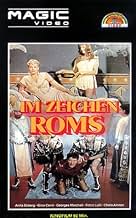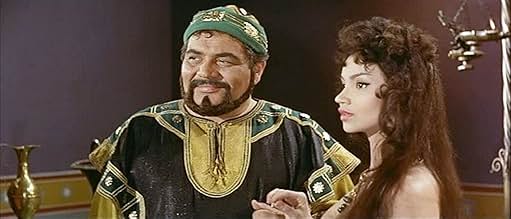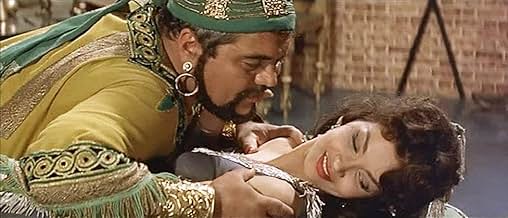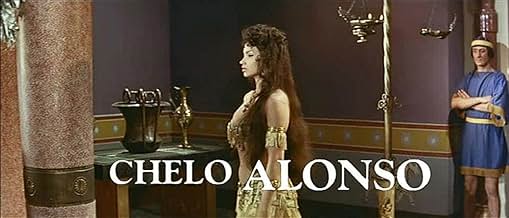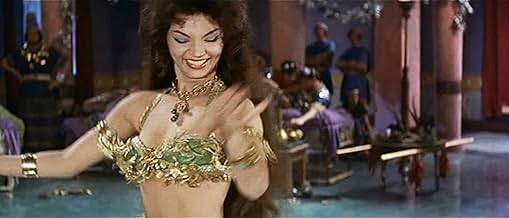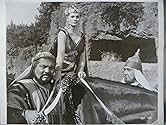Zenobia, Queen of Palmyra, revolts against Rome and defeats the Roman troops - but she makes a big mistake when she falls in love with enemy officer Marco Valerio.Zenobia, Queen of Palmyra, revolts against Rome and defeats the Roman troops - but she makes a big mistake when she falls in love with enemy officer Marco Valerio.Zenobia, Queen of Palmyra, revolts against Rome and defeats the Roman troops - but she makes a big mistake when she falls in love with enemy officer Marco Valerio.
Relja Basic
- Un soldato
- (uncredited)
Angelo Casadei
- Il generale
- (uncredited)
Aristide Catoni
- Un senatore
- (uncredited)
Arturo Dominici
- Un ufficiale di Zenobia
- (uncredited)
Storyline
Did you know
- TriviaOfficials at the American distributor, American-International Pictures, decided that "Sign of the Gladiator" was a more exciting title than "Sign of Rome," even though there are no gladiators in the film. They simply had one of the characters make reference to "gladiator" in a line of the dubbed dialog,
- GoofsIn the desert scenes there are often agaves which were introduced from the Americas only after 1500.
- Quotes
Zenobia, Queen of Palmira: If you have lied, the tigers at the temple will have a rich repast.
Marcus Valerius, Roman Consul: Your tigers will have to wait in vain.
- ConnectionsFeatured in Kolossal - i magnifici Macisti (1977)
- SoundtracksXenobia
(end title song, US dubbed version)
(1959)
Music by Dominic Frontiere
Lyrics by Milton Raskin
Sung by Bill Lee
Played by the Al Simms Sextet
Featured review
Sign of the Gladiator was the first Italian epic to be released by American International Pictures. In 1959 their co-founders James H. Nicholson and Samuel Z. Arkoff took careful note how arch rival Joe Levine had purchased the Steve Reeves epic Hercules for just 100,000 dollars and then made millions. So, Jim and Sam picked up another Reeves winner, Goliath and the Barbarians, plus what was to become their first Italian offering, At the Sign of Rome.
Although this one doesn't have a man with a big chest, it makes up for it with a woman of similar attributes. Anita Ekberg plays the Queen of the desert, Xenobia (spelled with an "X" in the AIP credits), and the Italian costume designers were clearly under orders to ensure that her 40-inch bosom receives maximum uncoverage. The off-the-shoulder black evening gown that she seductively wears when arraigned before the Roman Senate could well be the same dress she wore in La Dolce Vita, made the same year. For younger viewers there is plenty of action and sword play, and the battle scenes were possibly one of the first occasions that stunt men allowed themselves to be set on fire. The hero suffers a spear straight to the chest, but in true western style he's as right as rain a few scenes later.
AIP decided that Sign of the Gladiator would make a more exciting title than At the Sign of Rome, even though there wasn't a single gladiator in sight. This difficulty was solved by re-writing the opening narration in which we are told that officers and generals of the Roman army were often recruited from the ranks of gladiators and that the foremost of the ex-gladiators was chosen to lead the army against Xenobia's hordes. Unfortunately, anyone who misses the opening narration will be waiting 85 minutes for a gladiator who never shows up. New York-based Titra Sound, regarded as the best dubbing company of all time, supply the English narration and dialogue, spoken by legendary voice actors George Gonneau, Peggy Lobbin and Norman Rose.
For the music score AIP would frequently bring in Les Baxter to entirely re-score the film from beginning to end. However, for Sign of the Gladiator AIP retained the original score by Lavagnino, except for the opening and closing titles which were re-shot with fresh footage. For the main title we see a scantily-clad showgirl dancing round a flaming altar, accompanied by Lavagnino's eerie music from the scene where the hero is tortured by thirst in the desert. To accompany the end title AIP made the bold (though hardly artistic) decision to finish with a pop song. "Xenobia" was composed by future film music giant Dominic Frontiere, with lyrics by Milton Raskin. The vocalist was the dependable Bill Lee who the previous year was chosen to dub the singing voice of John Kerr in South Pacific. American International Records released "Xenobia" as a single (AIR 501), but by way of an in-house joke named the backing group as the "Al Simms Sextet." (Simms was a senior executive at AIP and in charge of the music department). Milton Raskin had an unenviable task in devising pop lyrics for an Italian epic, but this is what he came up with: "Xenobia, lovely as the night / Eyes of misty light / Holding me close to you / Xenobia, lips of flame and fire / Burning with desire / More than I ever knew / Xenobia, hear me call to you from afar / I will go wherever you are / Will you open your heart? / For this I know – I am yours if you will command / Take my arm and you'll understand / What I knew from the start / Xenobia, do you lead me on? / Will my dream be gone? / Will it fade in the blue above? / Be mine alone, Xenobia, my love ."
This film may have started out as a serious historical exercise, but by the time Miss Ekberg and AIP had finished, it was a fun entertainment movie for all the family .and highly enjoyable. More importantly, the release made a healthy profit for AIP who were then able to buy up over 50 other Italian epics, many of them going straight to another company venture -- American International Television.
Although this one doesn't have a man with a big chest, it makes up for it with a woman of similar attributes. Anita Ekberg plays the Queen of the desert, Xenobia (spelled with an "X" in the AIP credits), and the Italian costume designers were clearly under orders to ensure that her 40-inch bosom receives maximum uncoverage. The off-the-shoulder black evening gown that she seductively wears when arraigned before the Roman Senate could well be the same dress she wore in La Dolce Vita, made the same year. For younger viewers there is plenty of action and sword play, and the battle scenes were possibly one of the first occasions that stunt men allowed themselves to be set on fire. The hero suffers a spear straight to the chest, but in true western style he's as right as rain a few scenes later.
AIP decided that Sign of the Gladiator would make a more exciting title than At the Sign of Rome, even though there wasn't a single gladiator in sight. This difficulty was solved by re-writing the opening narration in which we are told that officers and generals of the Roman army were often recruited from the ranks of gladiators and that the foremost of the ex-gladiators was chosen to lead the army against Xenobia's hordes. Unfortunately, anyone who misses the opening narration will be waiting 85 minutes for a gladiator who never shows up. New York-based Titra Sound, regarded as the best dubbing company of all time, supply the English narration and dialogue, spoken by legendary voice actors George Gonneau, Peggy Lobbin and Norman Rose.
For the music score AIP would frequently bring in Les Baxter to entirely re-score the film from beginning to end. However, for Sign of the Gladiator AIP retained the original score by Lavagnino, except for the opening and closing titles which were re-shot with fresh footage. For the main title we see a scantily-clad showgirl dancing round a flaming altar, accompanied by Lavagnino's eerie music from the scene where the hero is tortured by thirst in the desert. To accompany the end title AIP made the bold (though hardly artistic) decision to finish with a pop song. "Xenobia" was composed by future film music giant Dominic Frontiere, with lyrics by Milton Raskin. The vocalist was the dependable Bill Lee who the previous year was chosen to dub the singing voice of John Kerr in South Pacific. American International Records released "Xenobia" as a single (AIR 501), but by way of an in-house joke named the backing group as the "Al Simms Sextet." (Simms was a senior executive at AIP and in charge of the music department). Milton Raskin had an unenviable task in devising pop lyrics for an Italian epic, but this is what he came up with: "Xenobia, lovely as the night / Eyes of misty light / Holding me close to you / Xenobia, lips of flame and fire / Burning with desire / More than I ever knew / Xenobia, hear me call to you from afar / I will go wherever you are / Will you open your heart? / For this I know – I am yours if you will command / Take my arm and you'll understand / What I knew from the start / Xenobia, do you lead me on? / Will my dream be gone? / Will it fade in the blue above? / Be mine alone, Xenobia, my love ."
This film may have started out as a serious historical exercise, but by the time Miss Ekberg and AIP had finished, it was a fun entertainment movie for all the family .and highly enjoyable. More importantly, the release made a healthy profit for AIP who were then able to buy up over 50 other Italian epics, many of them going straight to another company venture -- American International Television.
- How long is Sign of the Gladiator?Powered by Alexa
Details
- Release date
- Countries of origin
- Language
- Also known as
- Sheba and the Gladiator
- Filming locations
- Production companies
- See more company credits at IMDbPro
- Runtime1 hour 38 minutes
- Aspect ratio
- 2.35 : 1
Contribute to this page
Suggest an edit or add missing content


